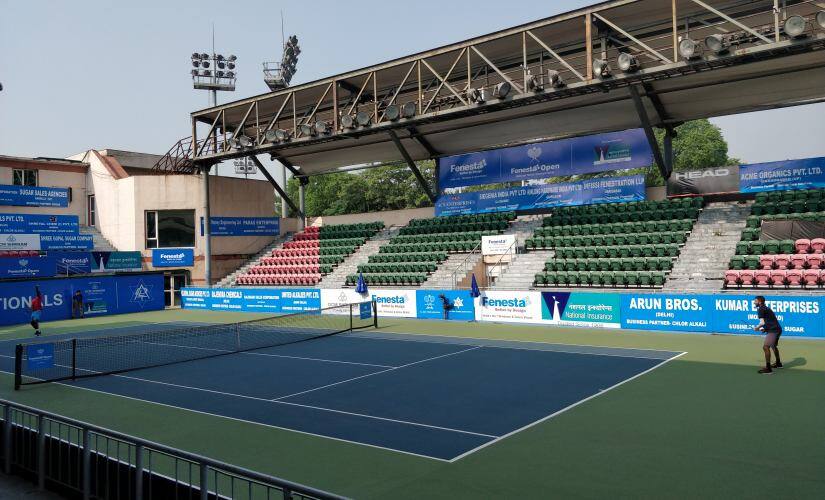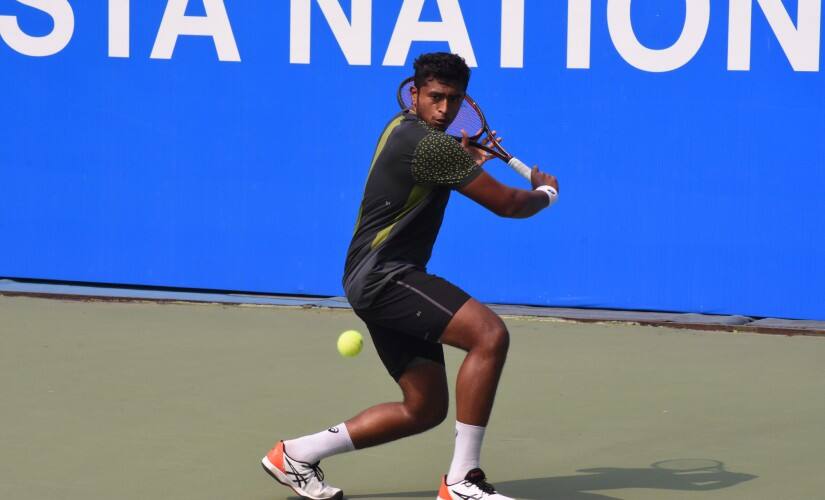Niki Poonacha is not the usual slugger you would see in current day and age of battles from the baseline. He likes to attack, he likes to take the ball early and move up whenever the opportunity presents itself. He likes to approach the net and kill things off early into the point. But when he squared off against Dalwinder Singh at the DLTA Courts early on Friday morning, he was finding it difficult to get his bearings right. He was unable to pick Dalwinder’s serve perfectly and was unable to do well on his own. Whenever the points did extend themselves, the slider and low balls were tough to work with. [caption id=“attachment_7452691” align=“alignleft” width=“380”]  Niki Poonacha and Dalwinder Singh at the net following their men’s singles semi-final at the 2019 Fenesta Open. Image courtesy: Tanuj Lakhina[/caption] No wonder then that the top seed at the National Tennis Championships then tried to mix things up. He would sometimes stay back and sometimes chip-and-charge to force mistakes. But to no avail. Having been broken in the third game, Poonacha looked out of sorts in the first set. Dalwinder then went on to save two break points to deny an opportunity to even things up. To make things tougher for the Andhra Pradesh player, he was broken another time – on the back of a forehand error – to go 2-5 down. Dalwinder, a Punjab player, had no trouble in holding serve and closing the set out, 6-2, in half an hour. “I was playing good, I was hitting hard. But then I wasn’t moving in on the short balls. I told myself so let’s go in and see what happens. Do this instead of standing back and losing the match. Let’s try something different. So I started getting more in going forward. So it actually really helped me out,” Poonacha told Firstpost after the draining match. “I wasn’t reading this shots. When he’s on the run and he’s slicing it, the ball is slow. I’m not sure whether is coming fast or slow. I was getting confused in the start. After that, I was watching more carefully. The ball was actually falling in the front so I started moving in,” he added. A toilet break at the change of sets and Poonacha started to improve. He was moving better, reading the ball far better and making an impact on Dalwinder’s serve. But that couldn’t prevent the 2017 nationals champion Dalwinder from taking a 3-2 lead with a break. Only, this time Niki found the extra gear he needed to break back. He broke once again at 6-5 and suddenly, against the run of play, the semi-final was headed to a third. “First set I wasn’t comfortable playing with his pace, wasn’t getting used to the speed of the ball and everything. But in the second set I changed my approach. I started attacking the first serve. So it got me into the point, I was controlling points a lot more better in the second and third set,” said Poonacha on the strategic change between the sets. If the first and second set were cagey and even affairs, the third started with breaks on either ends. The intensity level, despite the heat, went up a notch with both players producing fierce hitting from the back. Poonacha got the upper hand when Dalwinder made back-to-back forehand mistakes to hand the break. Poonacha thus served for the match at 5-3. But the final surge didn’t prove easy. Having led 30-0, Dalwinder took three straight points – one with the help of a double fault – to give himself slight hope. In a nervous service effort, Poonacha served four double faults and Dalwinder saved three match points. The job was complete when Poonacha moved up to the net on deuce and then on game to seal 2-6, 7-5, 6-3 win. Despite the dramatic win where he came from a set down, Poonacha seemed to be composed. But as soon as he stepped off the court, the 24-year-old gestured at how shaky his hand was. [caption id=“attachment_7452701” align=“alignnone” width=“825”]  Niki Poonacha came from a set down to beat 2017 national champion Dalwinder Singh. Image courtesy: Tanuj Lakhina[/caption] “Those games I usually get it done. I was up 30-0. And I thought, just keep on doing. I played one bad shot. And he played one good shot. The 30-30 double fault actually made me nervous. I was getting tight. The nerves had started kicking in. On the last last point, I thought, ‘instead of hitting it hard, let’s just kick and go in’ and it worked,” said Niki on the nervous final game. When he takes court on Saturday, he will meet a familiar face in Maharashtra’s Aryan Goveas. They’ve been on the same side of the net when playing doubles and are well aware of each other’s strengths and weaknesses due to their long hours spent practicing together. Goveas beat Kunal Anand of Delhi 6-4, 6-2 in a relatively easy win – reeling off six straight games in the second set. “I played him twice before – once nationally and then internationally and I’ve lost to him twice. So coming in, I knew it’s going to be a tough match and it’s not going to be very easy. I knew I needed to play my best and I was feeling good. But felt lazy at the start, had a long match in the last two days.I was a bit lazy and lethargic in the start. But as the match progressed, I started feeling much better. I think in the second set, my presence was much better on the court. And I think I was physically better. And that’s what got me through,” said Goveas after his win. [caption id=“attachment_7452881” align=“alignnone” width=“825”]  Aryan Goveas needed straight sets to book his place in the men’s singles final at the 2019 Fenesta Open.[/caption] “Niki and I know each other pretty well. We’ve practiced a lot together, we’ve played doubles together, so we know each other’s game inside out. It’s just going to be who’s going want it more, who’s going to be stronger tomorrow physically, mentally and that’s the guy who’s going to win. There’s no specific tactic because both of us can do equally on both sides. Both of us can hit our serves, our forehand and can run around. It’s just about who is mentally there and that I think that guy is going to win the match.” “I’m very happy that I could finish in straight sets today because I get more time to myself, to relax, to get fresh tomorrow. It makes a big difference playing one hour, one and a half hour less in this heat and humidity is a bonus. So I think that should be good to me,” he added. Whichever way the final goes, the men’s side will witness a first-time national champion. In the women’s competition, though, it could be a fifth title for Prerna Bhambri or a first for Sowjanya Bavisetti. Bhambri gave no chance to fellow Delhite Jagmeet Kaur in a comfortable 6-2, 6-1 win. For Sowjanya it was a tough fight on Court 6 before she beat Gujarat’s Vaidehi Chaudhari 6-3, 7-5.
Niki Poonacha set up men’s singles final with Aryan Goveas at the National Tennis Championships after a battling win over 2017 winner Dalwinder Singh.
Advertisement
End of Article
Written by Tanuj Lakhina
Tanuj Lakhina wishes there were more hours in the day for sports to be played and watched. see more


)

)
)
)
)
)
)
)
)



